merantau
Senior Member
Laid Back in Lombok.
The muezzin’s call to prayer hung in the still air while he paused to take breath. Each succeeding verse seemed to increase in dramatic intensity and the silence that reigned when the last note faded was total. It was 4.30 am or thereabouts. The Sasaks of Lombok are Muslims so, if you’re a light sleeper, either choose your lodgings well away from the local mosque or, be prepared to find ways to fill in your early mornings.
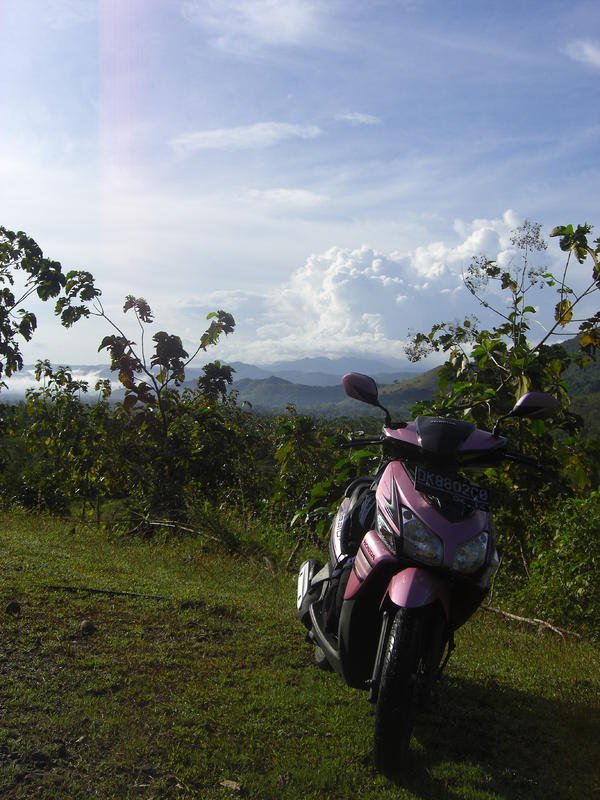
I went straight back to sleep and it wasn’t until the roosters started up, about an hour later, that I stirred. An early morning swim to wash the cobwebs away seemed like a good idea. The beach began at the bottom of the garden, twenty metres from my veranda – now that’s convenient!
The sea was flat and lazy. I cut a swath through its restfulness and swam to a buoy about 100 metres off shore. Looking back to land the scene was straight out of Conrad – a palm fringed beach, golden sand, a minaret poking skywards, smoke from a cooking fire, rising above the tree line, then curling lazily south before disappearing against the background of a rapidly lightening sky. A fisherman passed in his catamaran, outboard motor idling. A seabird wheeled above, scanning the sea with a practised eye, its mournful cry caressed shore-wards by a zephyr. A car horn hooted. Daybreak had come.
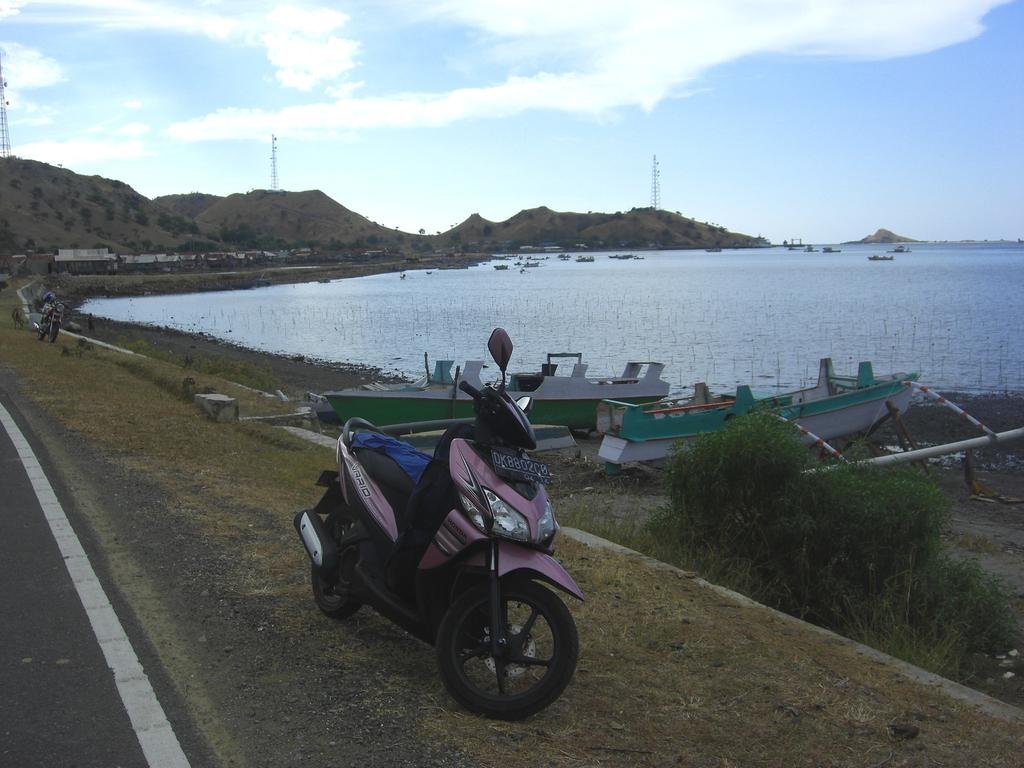
I swam back in and took a shower. By the time I’d dressed my host Siti Hawa had prepared breakfast – a golden brown banana pancake, covered with lashings of honey with a wedge of lemon on the side so as to bring the entire ensemble of taste buds into play. A pot of steaming hot, freshly brewed, Lombok coffee and a bowl of papaya, banana and pineapple completed this feast. I might have left Bali, the island of the Gods, but sure as hell I had washed up in a little corner of Paradise – Pondok Siti Hawa Backpackers – Shangri-La by the Sea! Totally relaxed I kicked back and began to plan the activities for the day.
First on the agenda was to give the bike a once over and a wash, then a trip into Senggigi to get my bearings, check out the restaurants and bars and maybe have a spot of lunch. A bucket of water and a rag were borrowed and before long the accumulated grime and grit of the previous day’s riding was despatched to the dustbin of history and I had a new looking bike again. Fluid levels all OK, I was ready for the road.
It was good to be riding without carrying any gear on the footplate. Just having that little bit more room to change position made a difference to the comfort factor of the machine. The 4km ride was over in no time. It took me along a busy coastal road with the sea, and a string of 3 star hotels on the left and farm land and modest dwellings, set among coconut trees and vegetable gardens, on the right.
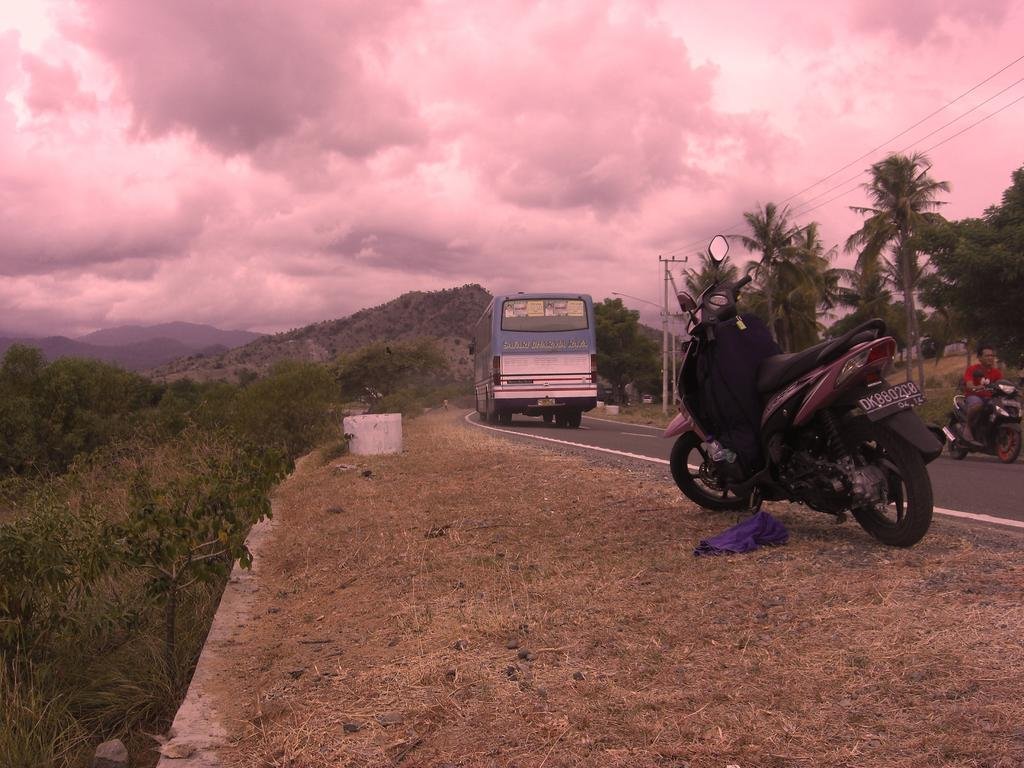
The approach to Senggigi town took me beneath a series of colourful banners strung across the road advertising the good time to be had at Club 69 Kareoke. “Happy Hour 8 – 9pm. Drinks ½ price. Thursday Nite: Ladies - Free Entry.” It was all happening at Club 69 that was for sure. I wondered how this sat with the local imams - a little awkwardly perhaps. But, then again, Indonesia is full of surprises and contradictions. The world’s most populous Muslim nation boasts among its national TV stars Nona Gunawan, a drag queen of muscular, if a little portly, physique whose popularity as a TV host, and 5-star celeb, is unrivalled. One gets a very different impression of Islam when the camera captures his audience, many of whom are be-scarfed Muslim women, rolling in the aisles at his bawdy double-entendres.
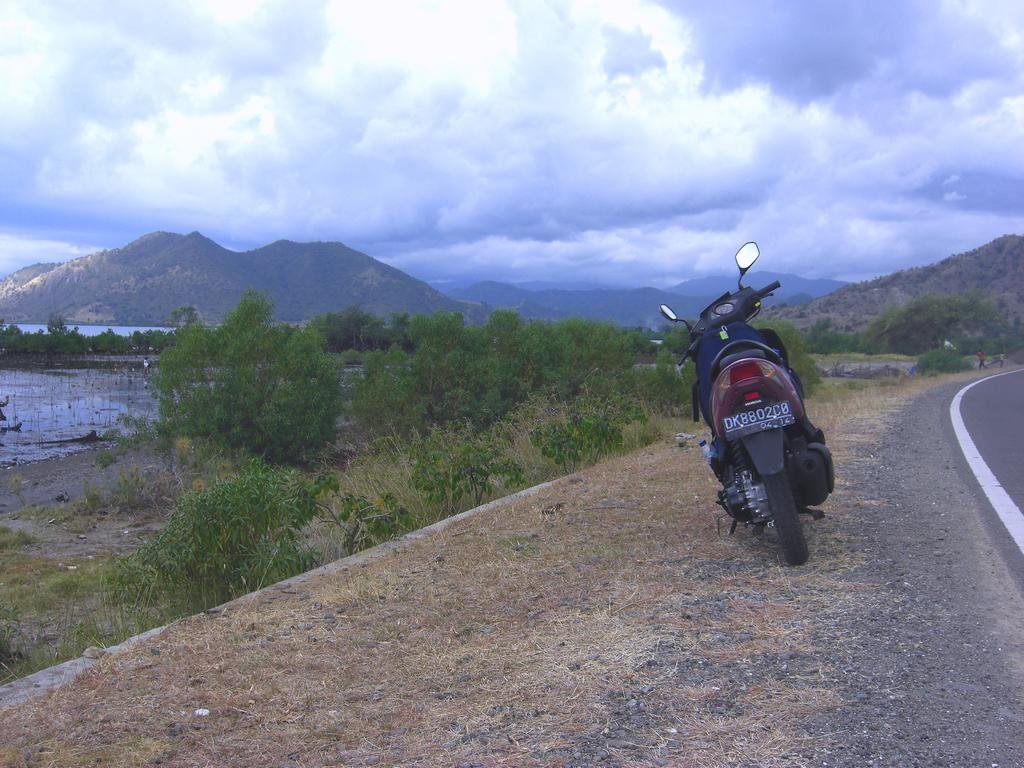
There was not a lot to see or do in Senggigi: a few boutiques displaying overpriced clothes, a clutch of tourist restaurants advertising overpriced meals, bars with boards out front advertising live music and a collection of dive shops and travel agents. They were all touting for custom from the available pool of tourists passing through, or just hanging out on their three week European summer breaks. Slim pickings indeed, as I saw only a handful of prospects strolling along the main drag. There were lots of ‘Accommodation Available’ signs on display. A sign advertising ‘Live AFL’ found me pulling up outside ‘The Office’ bar set adjacent to the beach and reached via a virtually deserted modern shopping mall.
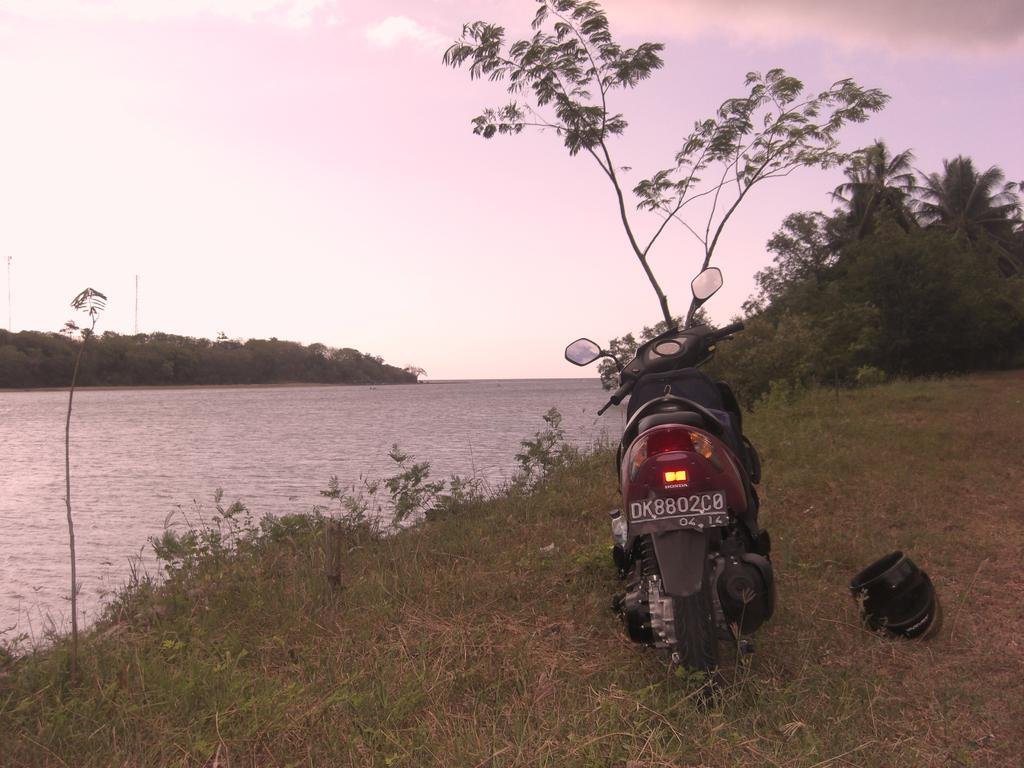
The bar featured a large screen showing MTV clips. The patrons were exclusively ex-pats and their Indonesian wives and kids. Seeing these half dozen blokes in their 50s hunched around a table drinking beer while their pretty, and much younger, wives sat on a bench along the wall chatting, while keeping an eye out on the kids, made me think that here were couples leading parallel lives. The men ignored the women and they returned the favour: hopefully their domestic situations were more blissful. I downed a cold Bintang and left feeling slightly depressed. Perhaps a game of footy on the big screen would have enlivened my spirits.
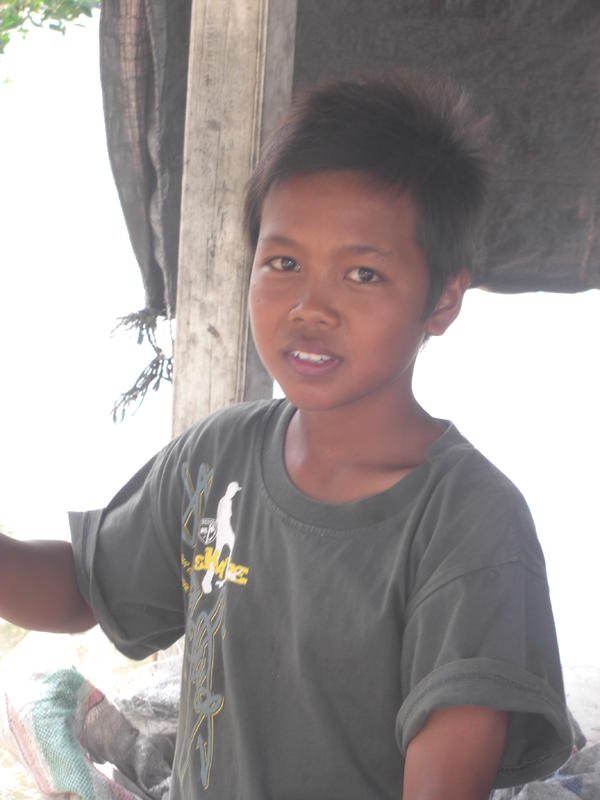
Back at Pondok Siti Hawa I spent my time swimming, eating and relaxing. Pak Husin had washed up on Lombok’s shores a quarter of a century ago after an expensive divorce settlement. He fell in love with the place, found his ideal partner, Siti, and they raised two sons. A dedicated environmentalist, into recycling and passionate about rubbish, he proudly tells guests that, ‘around here I’m known as the rubbish man.’ He has pioneered the collection of rubbish from the beach and the town area, beginning in a modest way and always looking to spread the word about the need to keep Senggigi clean. We spent many an hour yarning on the back veranda sitting on the chairs he’d made out of re-cycled car tyres. A man comfortable in two cultures he really conformed to the image of someone who had ‘gone native’. And good luck to him; he had carved out a very pleasant life for himself.
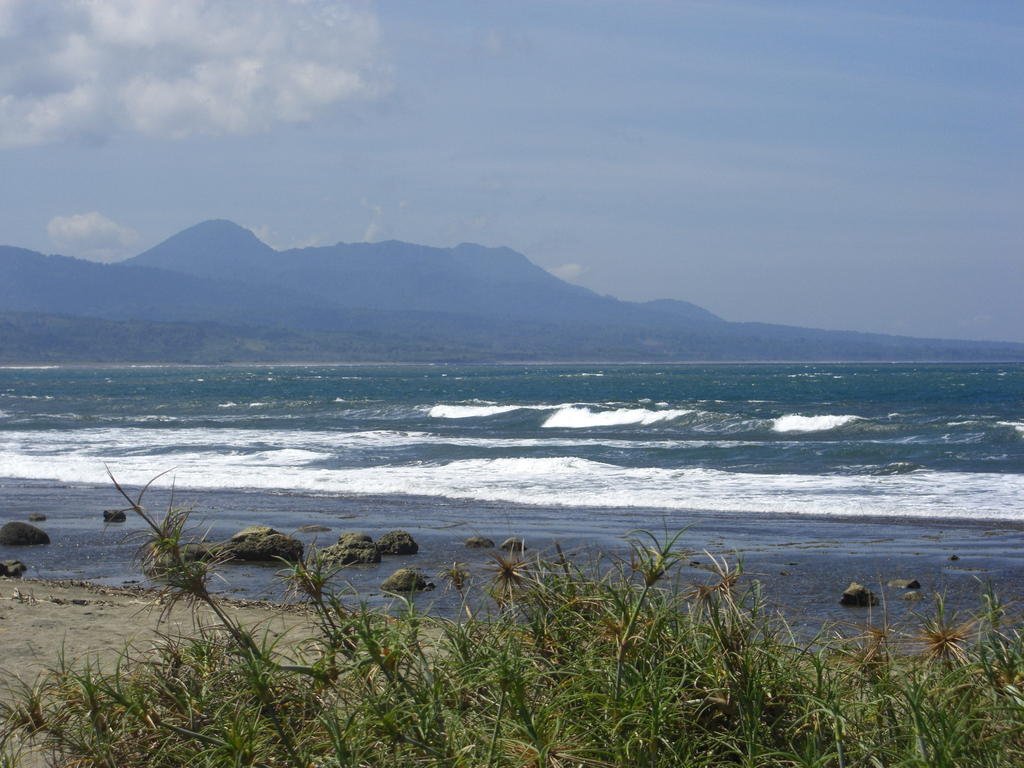
After a few very enjoyable days I made my farewells and rode out the gate, promising to drop by on the return journey. My route took me north around the coast – destination Labuhan Kayangan and the ferry that would take me to Poto Tano, ninety minutes away on the island of Sumbawa. The morning was crisp and clear and winding my way around the coastal road was sheer joy. A succession of superb little bays indented the coast, and the road, which climbed high above the sea, or dipped down to caress the shore, afforded superb views across to Bali and later, towards Kalimantan which lurked beyond the blue horizon. The countryside became notably drier and more sparsely populated as the road reached the northern limits of the island and began to bend eastwards. There were no green rice paddies anymore; just fields of corn and cassava interspersed with paddocks full of bushy scrub capable of sustaining goats but little else.
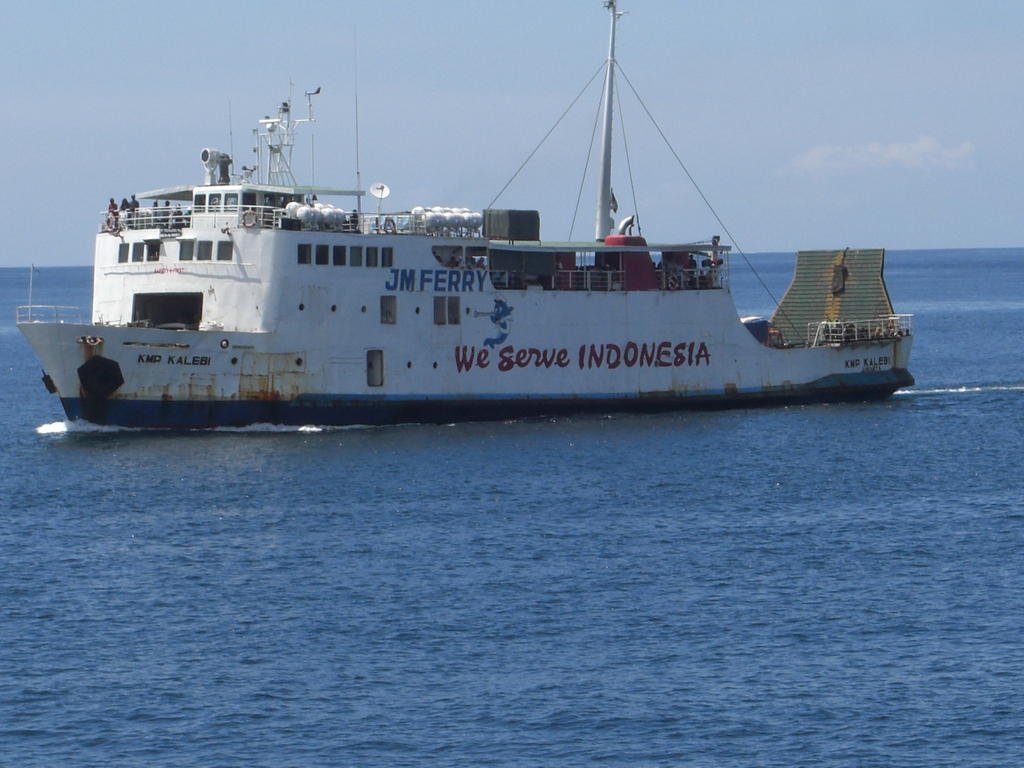
The heat rose with the sun; it was time for a drink. I pulled up at a little stall that sold petrol, snacks and nick-knacks and ordered a coffee. The young woman operator was a widow who, like millions of Indonesian women had spent time working overseas as part of TKI – Tenaga Kerja Indonesia or Indonesian Labour Power. She’d been employed in a Malaysian factory and had saved enough money to erect her modest stall, stock it and thus provide an income for herself and her two kids. Unless you’ve worked for the government there’s no social security so people and their families have to take care of themselves. Just to get by you have to be resourceful and resilient and Indonesians – by necessity - display these qualities in spades.
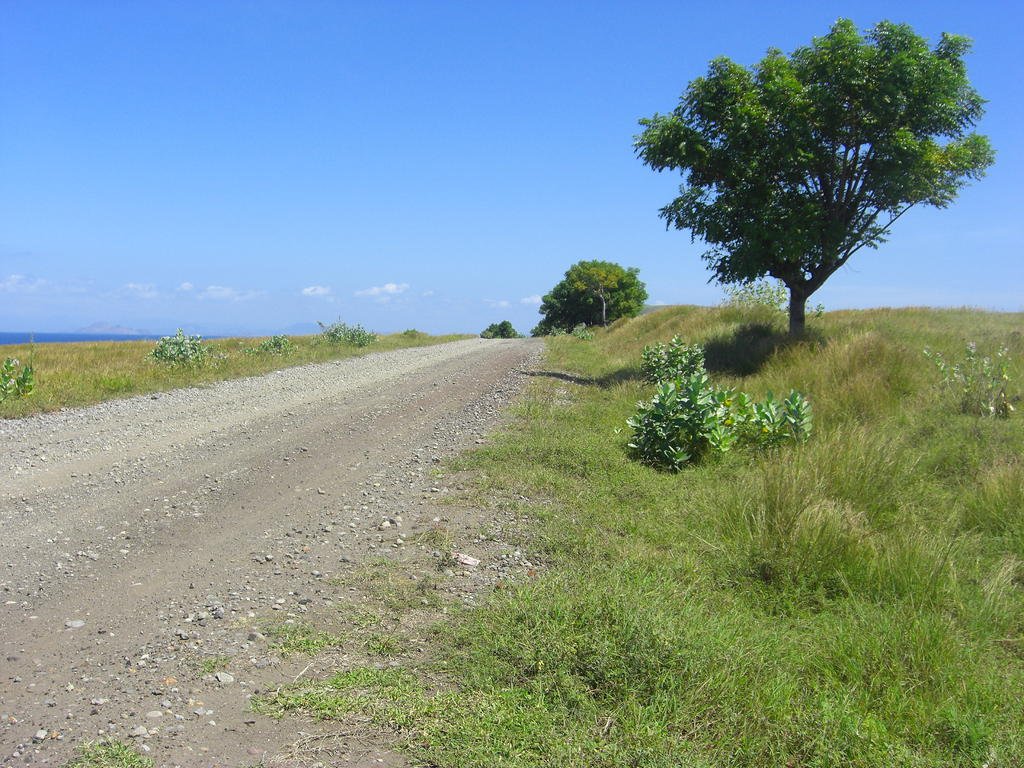
I rode on hoping to time my arrival at the port with the departure of the ferry. I knew they ran 24 hours a day but had no idea of the schedule. The road was practically deserted. Over to my right the land rose steadily, but gently, before disappearing into the low grey cloud that obscured the massive bulk of Mt. Rinjani, a 3700m active volcano. I ascended a low break in the hills and was confronted with a sparkling vista – the waters of Alas Strait glistening in the afternoon sun. Kayangan port and the ferry to Sumbawa beckoned. The little Honda seemed to quicken pace a little, eager to reach Sumbawa and come to grips with whatever surprises it had in store for us. Lombok had been laid back and languid maybe Sumbawa would be the same – we were about to find out!
Please note.
Since writing this piece, sadly Pak Husin has passed away – a good man with a strong community spirit who will always be fondly remembered.
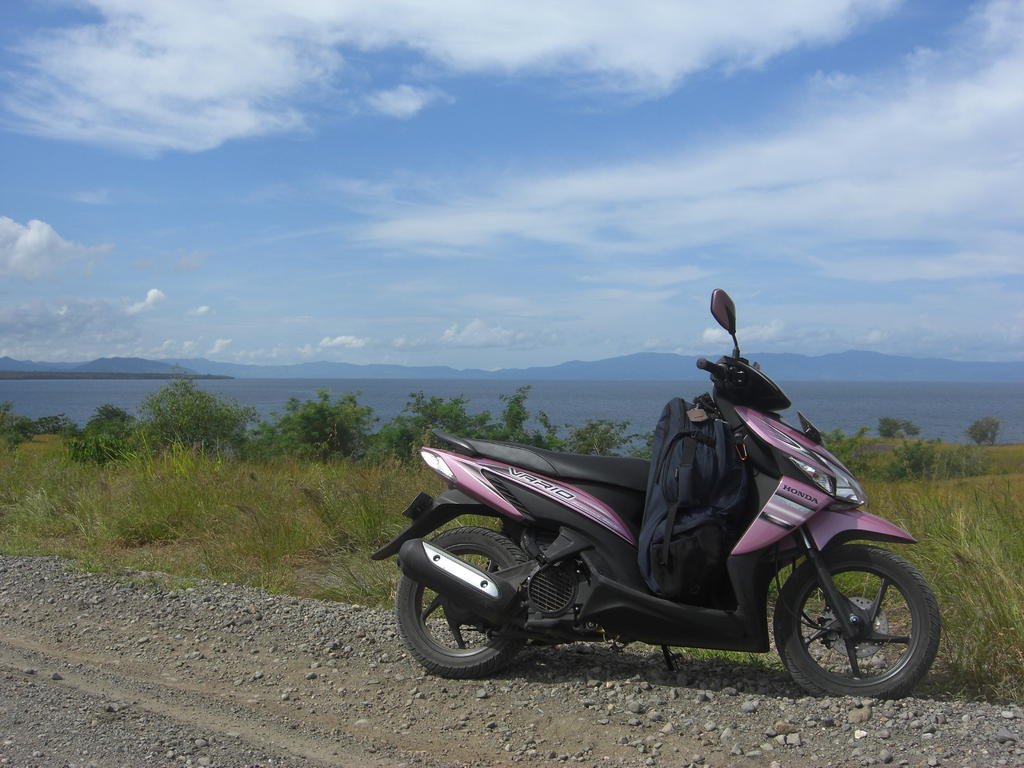
The muezzin’s call to prayer hung in the still air while he paused to take breath. Each succeeding verse seemed to increase in dramatic intensity and the silence that reigned when the last note faded was total. It was 4.30 am or thereabouts. The Sasaks of Lombok are Muslims so, if you’re a light sleeper, either choose your lodgings well away from the local mosque or, be prepared to find ways to fill in your early mornings.

I went straight back to sleep and it wasn’t until the roosters started up, about an hour later, that I stirred. An early morning swim to wash the cobwebs away seemed like a good idea. The beach began at the bottom of the garden, twenty metres from my veranda – now that’s convenient!
The sea was flat and lazy. I cut a swath through its restfulness and swam to a buoy about 100 metres off shore. Looking back to land the scene was straight out of Conrad – a palm fringed beach, golden sand, a minaret poking skywards, smoke from a cooking fire, rising above the tree line, then curling lazily south before disappearing against the background of a rapidly lightening sky. A fisherman passed in his catamaran, outboard motor idling. A seabird wheeled above, scanning the sea with a practised eye, its mournful cry caressed shore-wards by a zephyr. A car horn hooted. Daybreak had come.

I swam back in and took a shower. By the time I’d dressed my host Siti Hawa had prepared breakfast – a golden brown banana pancake, covered with lashings of honey with a wedge of lemon on the side so as to bring the entire ensemble of taste buds into play. A pot of steaming hot, freshly brewed, Lombok coffee and a bowl of papaya, banana and pineapple completed this feast. I might have left Bali, the island of the Gods, but sure as hell I had washed up in a little corner of Paradise – Pondok Siti Hawa Backpackers – Shangri-La by the Sea! Totally relaxed I kicked back and began to plan the activities for the day.
First on the agenda was to give the bike a once over and a wash, then a trip into Senggigi to get my bearings, check out the restaurants and bars and maybe have a spot of lunch. A bucket of water and a rag were borrowed and before long the accumulated grime and grit of the previous day’s riding was despatched to the dustbin of history and I had a new looking bike again. Fluid levels all OK, I was ready for the road.
It was good to be riding without carrying any gear on the footplate. Just having that little bit more room to change position made a difference to the comfort factor of the machine. The 4km ride was over in no time. It took me along a busy coastal road with the sea, and a string of 3 star hotels on the left and farm land and modest dwellings, set among coconut trees and vegetable gardens, on the right.

The approach to Senggigi town took me beneath a series of colourful banners strung across the road advertising the good time to be had at Club 69 Kareoke. “Happy Hour 8 – 9pm. Drinks ½ price. Thursday Nite: Ladies - Free Entry.” It was all happening at Club 69 that was for sure. I wondered how this sat with the local imams - a little awkwardly perhaps. But, then again, Indonesia is full of surprises and contradictions. The world’s most populous Muslim nation boasts among its national TV stars Nona Gunawan, a drag queen of muscular, if a little portly, physique whose popularity as a TV host, and 5-star celeb, is unrivalled. One gets a very different impression of Islam when the camera captures his audience, many of whom are be-scarfed Muslim women, rolling in the aisles at his bawdy double-entendres.

There was not a lot to see or do in Senggigi: a few boutiques displaying overpriced clothes, a clutch of tourist restaurants advertising overpriced meals, bars with boards out front advertising live music and a collection of dive shops and travel agents. They were all touting for custom from the available pool of tourists passing through, or just hanging out on their three week European summer breaks. Slim pickings indeed, as I saw only a handful of prospects strolling along the main drag. There were lots of ‘Accommodation Available’ signs on display. A sign advertising ‘Live AFL’ found me pulling up outside ‘The Office’ bar set adjacent to the beach and reached via a virtually deserted modern shopping mall.

The bar featured a large screen showing MTV clips. The patrons were exclusively ex-pats and their Indonesian wives and kids. Seeing these half dozen blokes in their 50s hunched around a table drinking beer while their pretty, and much younger, wives sat on a bench along the wall chatting, while keeping an eye out on the kids, made me think that here were couples leading parallel lives. The men ignored the women and they returned the favour: hopefully their domestic situations were more blissful. I downed a cold Bintang and left feeling slightly depressed. Perhaps a game of footy on the big screen would have enlivened my spirits.

Back at Pondok Siti Hawa I spent my time swimming, eating and relaxing. Pak Husin had washed up on Lombok’s shores a quarter of a century ago after an expensive divorce settlement. He fell in love with the place, found his ideal partner, Siti, and they raised two sons. A dedicated environmentalist, into recycling and passionate about rubbish, he proudly tells guests that, ‘around here I’m known as the rubbish man.’ He has pioneered the collection of rubbish from the beach and the town area, beginning in a modest way and always looking to spread the word about the need to keep Senggigi clean. We spent many an hour yarning on the back veranda sitting on the chairs he’d made out of re-cycled car tyres. A man comfortable in two cultures he really conformed to the image of someone who had ‘gone native’. And good luck to him; he had carved out a very pleasant life for himself.

After a few very enjoyable days I made my farewells and rode out the gate, promising to drop by on the return journey. My route took me north around the coast – destination Labuhan Kayangan and the ferry that would take me to Poto Tano, ninety minutes away on the island of Sumbawa. The morning was crisp and clear and winding my way around the coastal road was sheer joy. A succession of superb little bays indented the coast, and the road, which climbed high above the sea, or dipped down to caress the shore, afforded superb views across to Bali and later, towards Kalimantan which lurked beyond the blue horizon. The countryside became notably drier and more sparsely populated as the road reached the northern limits of the island and began to bend eastwards. There were no green rice paddies anymore; just fields of corn and cassava interspersed with paddocks full of bushy scrub capable of sustaining goats but little else.

The heat rose with the sun; it was time for a drink. I pulled up at a little stall that sold petrol, snacks and nick-knacks and ordered a coffee. The young woman operator was a widow who, like millions of Indonesian women had spent time working overseas as part of TKI – Tenaga Kerja Indonesia or Indonesian Labour Power. She’d been employed in a Malaysian factory and had saved enough money to erect her modest stall, stock it and thus provide an income for herself and her two kids. Unless you’ve worked for the government there’s no social security so people and their families have to take care of themselves. Just to get by you have to be resourceful and resilient and Indonesians – by necessity - display these qualities in spades.

I rode on hoping to time my arrival at the port with the departure of the ferry. I knew they ran 24 hours a day but had no idea of the schedule. The road was practically deserted. Over to my right the land rose steadily, but gently, before disappearing into the low grey cloud that obscured the massive bulk of Mt. Rinjani, a 3700m active volcano. I ascended a low break in the hills and was confronted with a sparkling vista – the waters of Alas Strait glistening in the afternoon sun. Kayangan port and the ferry to Sumbawa beckoned. The little Honda seemed to quicken pace a little, eager to reach Sumbawa and come to grips with whatever surprises it had in store for us. Lombok had been laid back and languid maybe Sumbawa would be the same – we were about to find out!
Please note.
Since writing this piece, sadly Pak Husin has passed away – a good man with a strong community spirit who will always be fondly remembered.



